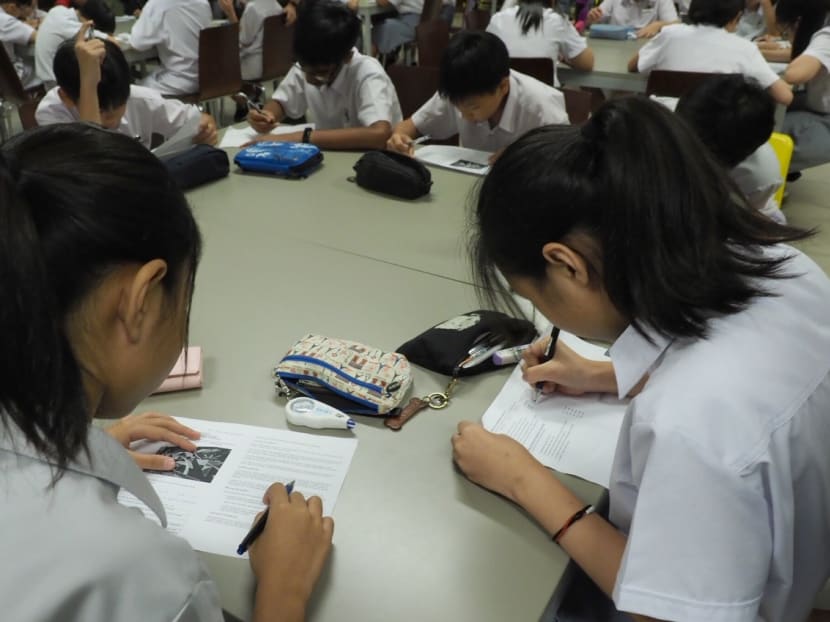S’pore students top global benchmarking survey for maths, science, but less confident than peers about learning these subjects
SINGAPORE — Students in Singapore have topped an international ranking for science and mathematics abilities for a third time since 2003, outperforming their peers from 71 other countries, based on a study released on Tuesday (Dec 8).

For the third time since 2003, students in Singapore topped the International Mathematics and Science Study.
- For the third time since 2003, students in Singapore topped the International Mathematics and Science Study
- They beat students from 71 other education systems
- The study measures how well students understand, apply, and reason concepts in mathematics and science
- A total of 10,800 Primary 4 and Secondary 2 students in Singapore were involved
SINGAPORE — Students in Singapore have topped an international ranking for science and mathematics abilities for a third time since 2003, outperforming their peers from 71 other countries, based on a study released on Tuesday (Dec 8).
The International Mathematics and Science Study (TIMSS) 2019 also found, however, that while students here adopted a positive attitude towards learning both subjects, they expressed less confidence in learning them compared with their peers internationally.
The study, conducted every four years since 1995, measures how well students at Grade 4 and Grade 8 — the equivalent of Primary 4 and Secondary 2 in Singapore — understand, apply, and reason concepts in mathematics and science.
Primary 4 pupils in Singapore scored an average of 625 in maths, compared to second-placed Hong Kong’s 602 points and South Korea’s 600 points.
When it came to science at the same level, Singapore pupils scored 595 on average while South Korea was in second place with a score of 588 and Russia was third with a score of 567.
At the Secondary 2 level, Singapore students topped the math ranking with an average score of 616. Taiwan was a close second with 612 points, while students in South Korea scored an average of 607 points to come in third.
When it came to science at the same level, Singapore students scored 608 points on average while students from Taiwan got 574 points and those in Japan scored 570 points.
The Ministry of Education (MOE) said that a representative population for the study — 5,990 Primary 4 pupils and 4,850 Secondary 2 students — were chosen at random from all public schools.
GOOD SHOWING FROM STUDENTS: MOE
MOE said that while students from Singapore topped the rankings in 2015 as well, there was an improvement in some of the scores in the latest survey.
Secondary 2 students have made a “substantial improvement” in their science score, it added, with this being the first time that they have scored above 600 points in TIMSS.
In the 2015 study, students scored 597 on average. Secondary 2 students’ average score for maths, however, dipped from 621 to 616 since the last study.
For Primary 4 pupils, the average math scores went up from 618 to 625, while average science scores increased from 590 to 595.
MOE said that Singapore also continues to have one of the highest proportions of students who have attained the top two international benchmarks — advanced and high. The cut-off point for the benchmarks are 625 and 550 respectively.
At least seven in 10 of the participating students attained these two top benchmarks at each grade and subject, which demonstrated “their ability in applying mathematical and scientific knowledge and concepts, and using reasoning skills to solve complex problems”, the ministry said.
Only a very small proportion of the students did not manage to attain the lowest international benchmark of competence.
Compared to the 8 to 15 per cent international median, only 1 to 2 per cent of Singapore’s students were unable to master basic mathematics or science.
“All our students have done well by international standards, not just those who are academically stronger,” MOE said. “In particular, our students who are academically weaker achieved scores that are among the highest across all participating systems.”
LACK OF CONFIDENCE
Despite the consistently strong showing in the studies, and a general interest in mathematics and science, the study found that Singapore students lacked confidence when it came to studying these subjects.
For instance, when queried about how confident they were when it comes to learning mathematics, only two in 10 Primary 4 pupils and one in 10 Secondary 2 students responded that they were “very confident”.
The average response globally was three in 10 and two in 10 for the two respective groups of students.
When it came to science, about two in 10 students at both levels reported being “very confident” in learning the subject, compared to the global average of four in 10 for Primary 4 and two in 10 for the Secondary 2 level.
MOE attributed this self-reported lack of confidence to cultural norms and said that similar results were observed in other Asian countries.
“Nonetheless, we will continue to work closely with parents and other stakeholders to help our students learn deeply, while fostering a stronger sense of confidence so that they can enjoy learning and maintain a strong desire to learn,” it said.











